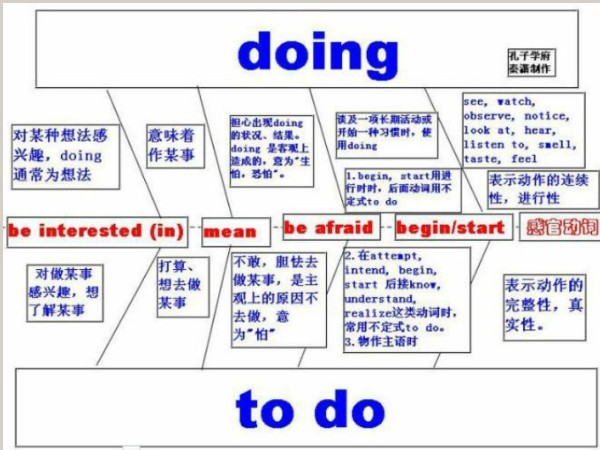本试题 “— Would you mind________the window?It's hot here!— ________.[ ]A. to open; No, pleaseB. open; Yes, pleaseC. opening; No, of course notD. opening; Y...” 主要考查您对动名词
一般疑问句
等考点的理解。关于这些考点您可以点击下面的选项卡查看详细档案。
- 动名词
- 一般疑问句
动名词概念:
动名词是一种兼有动词和名词特征的非限定动词。它可以支配宾语,也能被副词修饰,动名词有时态和语态的变化。
现在分词和动名词用法比较:
动词的-ing形式包括现在分词和动名词两种形式。他们的句法功能如下:
动词的-ing形式如果作句子的主语或者宾语时,应该是动名词形式;如果作补语或者状语时,应该是现在分词形式。那么作表语或者定语的动名词和现在分词又该怎样区分呢?
1、动名词与现在分词作表语时的比较:
(1)动名词作表语说明主语的内容,回答what的问题;现在分词作表语相当于形容词作表语,说明主语的性质、特征等,回答how的问题。
如:One of the best exercises is swimming. 游泳是最好的运动项目之一。
What pleases him most is bathing in the sea. 最使他高兴的事是在海中沐浴。
The situation both at home and abroad is very in-spiring. 国内外的形势都很鼓舞人心。
The color is pleasing to the eye. 颜色悦目。
(2)动名词作表语,表语和主语几乎处于同等地位,可以互换位置,其句意不变;现在分词作表语,表语和主语则不能互换位置。
如:Our work is serving the people.
(=Serving the people is our work.)我们的工作是为人民服务。
The news was disappointing. 那消息令人失望。
(3)作表语的现在分词前可以用very,quite,rather,greatly等副词修饰,而动名词则不可以。
如:What he said was very encouraging. 他的话很鼓舞人心。
Our goal is realizing the four modernizations in the near future. 我们的目标是在不久的将来实现四个现代化。
(4)现在分词与形容词一样可以和more,the most构成形容词的比较级和最高级,而动名词则不可以。
如:The story is the most fascinating. 那个故事最迷人。
(5)作表语用的现在分词除了和be连用以外,还可以和其它的系动词连用;而作表语的动名词则通常只能和be连用。
如:His speech seems inspiring.他的演讲似乎很鼓舞人心。
His interest is writing for the news papers. 他的爱好是给报社写文章。
(6)有些用作表语的现在分词已经形容词化了。常见的有:exciting,moving,inspiring,missing,interesting,disappointing等。
2、动名词与现在分词作定语时的比较:
(1)动名词作定语时,表示它所修饰的名词的性能和用途,和它所修饰的名词在逻辑上没有主谓关系;
现在分词作定语时,表示它所修饰的名词正在进行的动作,和它所修饰的名词在逻辑上有主谓关系,常可以扩展成一个定语从句。
如:a swimming girl=a girl who is swimming 一个在游泳的姑娘
a walking stick=a stick that is used for walking 一根拐杖
(2)现在分词作定语有时可以后置,而动名词则通常只能放在它所修饰的名词之前。
如:The girl wearing glasses is one of his students. 戴眼镜的那个女孩是他的一个学生。
I bought some reading materials. 我买了一些阅读材料。
动名词的用法:
1、作主语:
例如:Fighting broke out between the South and the North. 南方与北方开战了。
2、作宾语:
a. 有些动词可以用动名词作宾语。
例如:admit承认 appreciate感激 avoid避免 complete完成 consider认为 delay耽误 deny否认 detest讨厌 endure忍受 enjoy喜欢 escape逃脱 fancy想象 finish完成 imagine想象 mind介意 miss想念 postpone推迟 practice训练 recall回忆 resent讨厌 resume继续 resist抵抗 risk冒险 suggest建议 face面对 include包括 stand忍受 understand理解 forgive宽恕 keep继续
例如:Would you mind turning down your radio a little, please? 你把收音机音量调小一点,好吗?
The squirrel was lucky that it just missed being caught. 这松鼠幸运得很,刚逃避了被逮住的厄运。
b. 有些结构后面可以用动名词作宾语或其他成分。
例如:admit to prefer...to burst out keep on insist on count on set about put off be good at take up give up be successful in be used to lead to devote oneself to object to stick to no good no use be fond of look forward to be proud of be busy can't help be tired of be capable of be afraid of think of
3、作表语,对主语说明、解释:
例如:Her job is washing, cleaning and taking care of the children. 她的工作是洗刷、清扫和照顾孩子。
比较:She is washing, cleaning and taking care of the children.
4、作定语,一般表示所修饰名词事物的用途:
例如:a writing desk=a desk for writing 写字台
a swimming pool=a pool swimming 游泳池
有些动名词作定语,与所修饰的名词关系比较复杂。
例如:boiling point=a temperature point at which something begins to boil 沸点
a walking tractor=a tractor which a driver can operate while he or she is walking behind it 手扶拖拉机
动名词知识体系:

动名词与不定式用法对比:

一般疑问句的概念:
就全句提出问题,希望对方给予肯定或否定答复的问句,叫做一般疑问句。回答时要用Yes或No来开头,句末用问号,朗读时用升调。其结构是:系动词be/助动词/情态动词+主语+其他成分?
一般疑问句用法要点:
一、一般疑问句的基本结构:
1、如果谓语中有情态动词、助动词或be,将这些词移到主语之前。
如:Can you dance? 你会跳舞吗?
Will he go there tomorrow? 他明天去那里?
Are you a student? 你是学生吗?
2、如果谓语中没有情态动词、助动词或be,就在主语前加助动词do(does、did),原来的动词都用原形。
如:Do you like English? 你喜欢英语吗?
Does your brother like English? 你的兄弟喜欢英语吗?
Did you sleep well last night? 你昨晚睡得好吗?
注:have做助动词时,将其移至主语前;作“有”解时也可以将其移至主语前;不是作“有”解的为行为动词时,其疑问式和其他行为动词一样要在主语前加do(does、did)。
如:Has he gone to England? 他到英国去了?
Have you(=Do you have)a car? 你有汽车吗?
Do you have lunch at school? 你是在学校吃中饭的吗?
二、一般疑问句的简略回答:
如:—Can you swim? 你会游泳吗?
—Yes, I can.(No, I can't)会。(不会)
—Have you finished your work? 你工作做完了吗?
—Yes, I have.(No, I haven't.)做完了。(还没有。)
—Is this your pen? 这是你的钢笔吗??
—Yes, it is. (No, it isn't)是的。(不是。)
三、一般疑问句的否定形式:
当说话人或是期待肯定的回答或是不期待对方的回答时用否定式。其结构,在口语里,总是把not与情态动词、助动词或be缩略成一个词;有时也将not放在主语后。
如:Can't you see the kite? 难道你看不到那个风筝?
Don't you like playing football? 难道你不喜欢踢足球?
Aren't you(=Are you not)aYoung Pioneer?难道你不是少先队员?
四、注意否定疑问句的回答:
英语的yes和no是对答语的肯定或否定,而不是对问句的肯定或否定,所以只要答语是肯定的,就用“Yes+肯定结构”,答语是否定的,就用“No+否定结构”。这与汉语的习惯不同。
如:—Won't he go to the hospital? 难道他不去医院了?
—Yes, he will. (No, he won't.)不,他去。(是的,他不去。)
—Can't you speak English? 你难道不会讲英语吗?
—Yes, I can. (No, I can't.)不,我会。(是的,我不会)
五、陈述句语序的一般问句:
这种疑问句指望对方作出肯定的答复,其疑问意思由句末的升调来表达。
如:You want to see him? 你想见他?
I think they have asked for better pay again? 我想他们又要求加工资了吧?
不用yes或者no回答的一般疑问句:
用yes或no回答的疑问句叫做一般疑问句。但一般疑问句并不一定都用yes或no来回答,请看下面几种情况。
一、对别人的问话表示同意时,用yes回答固然可以,但如果更直截了当地回答时,可以不用yes。
1:Jim:Do you want a go?
Ling:OK, thanks.
2:Teacher:Could you take it to the classroom?
Liu Ming:Certainly.
3:Meimei:May I come then?
Ann:Sure!Work must come first!
注:ctrtainly多用于英国英语,而sure多用于美国英语。
如:Ann:May I go with you?
WeiHua:Why not?His home isn't far from here. Let's go.
二、对于别人提问的情况似乎知道,但回答时又没有多大把握时,可以用提问的方式、商量的口气或其他方式回答对方。
1、Meimei:Where's Wuhan?Do you know?
Lily:Er, is it in Hebei?
2、A:Is it in the box?
B:Let me have a look. Oh, here it is.
3、WeiHua:Is it ready now?
UncleWant:Come and look.
三、有些问题的答语不宜模棱两可,需要准确具体,否则,可能会引起别人的误解。
如:Wang:Can you speak Chinese?
Jim:Only a little.
注:若用yes回答,别人会认为你的汉语不错。
四、为了使回答显得委婉、客气、往往不采用yes来十分肯定自己的看法,也不用no来断然否定别人的意见,说话往往留有余地而礼貌谦恭。
1、A:Can you mend it?
B:I think so. Let me see.
2、A:Do you have a big piece, please?
B:Sorry, I don't.
3、Kate:Isthekitebroken?
Jim:I don't think so.
五、乐意或拒绝接受对方的邀请或要求时,不用yes或no,当拒绝或有不同的看法时,要婉言谢绝或提出自己的看法。
1、Ann:Would you like to come to supper?
Meimei:Oh, thank you!I would love to!But I must ask my parents first.
2、Jim:Shall we go to the park?
LinTao:Good idea!When shall we meet?
3、LiLei:Could I speak to Jim, please?
Kate:I'm afraid he's out at the moment.
4、LiLei:Oh!Is that a ball?Aren't all balls round?
Sam:Not in the USA.
5、A:Shall we meet at half past two?
B:All right.
六、在回答有些问题时,若回答者不愿或不便表明自己的态度,也往往不用yes或no作正面的回答。
1、A:Do you like doing housework?
B:I don't know.
2、A:Where're Lucy's pencils?Are they on her desk?
B:I can't see.
与“— Would you mind________the window?It's hot here!— ______...”考查相似的试题有:
- Every possible means _______ to prevent the crash , but the computer doesn’t still work.A.is usedB.are usedC.has ...
- .When you look for a job, it’s not your book knowledge but your experience ________matters more.A.whetherB.whichC...
- He had no choice but________till his mother came back.A.waitedB.waitingC.to waitD.wait
- I couldn’t ______ you more. He is an excellent lawyer.A.deal withB.agree withC.meet withD.do with
- The old mall and his wife _____ for the government in New York but now they _____ a simple life.[ ]A. were used to wo...
- .Michael Jordan, best known as__top scorer in ______NBA, did much charity work for society.A.a, aB.the, theC.a, /D...
- --- Does the idea of going to watch the football game tonight ______ to you?--- Well, it depends on the weather. ____...
- — Robert is indeed a wise man.— Oh, yes. How often I have regretted _____ his advice![ ]A. to takeB. takingC. not to ...
- All the staff in our company are considering _____ to the city centre for the fashion show.[ ]A. to goB. goingC. to h...
- _____did she get this information?A.WhomB.WhoC.WhereD.What